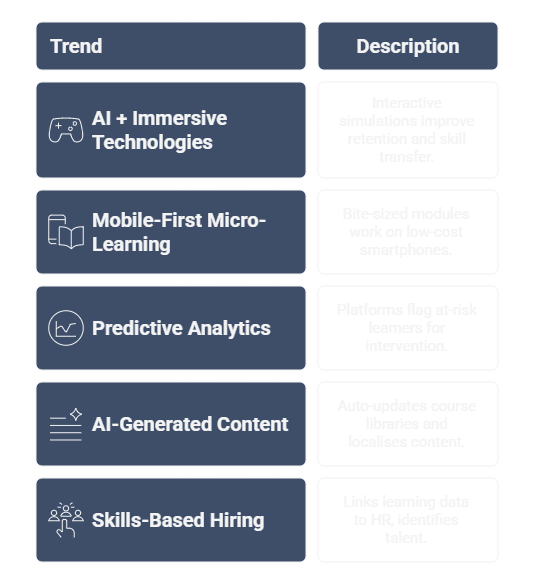
Artificial intelligence is changing the way we learn, train, and develop. In South Africa, unemployment remains very high. Many young people don’t have access to quality education. AI-powered learning management systems (LMSs) offer a way to scale learning without increasing costs.
As we move into 2025, AI-driven LMSs aren’t just a global trend. They’re a local necessity. This guide explains what they are, how they’re transforming South African learning, and what organisations should consider when using them.
What Is an AI-Powered LMS?
An AI LMS integrates machine learning, natural language processing, and analytics into one learning ecosystem. Unlike standard platforms that rely on manual input and static content delivery with limited adaptability to individual learners, AI-driven systems learn from learner behaviour. They can adapt courses, suggest modules, and predict performance gaps.
Here are ways instructional designers use AI to design smarter courses and faster, more engaging learning journeys:
- AI fuels creative ideation. It sparks fresh topics, sharpens ideas, and challenges human bias.
- AI builds digital co-workers. From tutor bots to design assistants, it delivers content, feedback, and support 24/7.
- AI accelerates research. It pulls insights from vast sources, helping designers master new subjects quickly.
- AI plans lessons. It maps out learning journeys, scripts lessons, and generates scenario-based activities in minutes.
- AI creates multimedia. It produces images, videos, and audio instantly—turning concepts into complete experiences.
- AI updates content. It curates, localises, and translates materials for diverse learners and cultures.
- AI finds patterns. It analyses data, reveals trends, and guides smarter design decisions.
- AI writes assessments. It generates aligned questions and realistic distractors that test real understanding.
- AI reads the room. It tracks sentiment, analyses feedback, and predicts learning outcomes.
- AI learns your brand. It absorbs tone, style, and voice. This way every output feels authentically you.
Why the South African Market Needs AI-Powered LMSs
South Africa faces a unique learning challenge: a large, young population but limited access to affordable, quality training. The latest Stats SA figures place youth unemployment at over 46%. Many job seekers lack relevant digital skills. Traditional classroom and LMS models struggle to reach these learners. The reasons include high data costs, inconsistent internet connections, and outdated content.
An AI-enabled LMS can help bridge these gaps by:
- Scaling training affordably: AI automates much of the administration and grading process, freeing facilitators to focus on engagement.
- Personalising learning: Adaptive learning ensures that each learner, whether in a corporate setting or a township youth centre, progresses at their own pace.
- Enhancing accessibility: AI can translate, transcribe, and simplify content for multilingual audiences, crucial in South Africa’s 11-language landscape.
- Driving employability: Micro-credentials, gamified assessments, and real-time feedback help learners gain work-ready skills faster.
As New Leaf’s own projects have shown, personalized learning paths powered by AI can achieve very high completion rates. For example, the Wellness Warehouse training initiative achieved completion rates as high as 98%. For more, watch the Wellness Warehouse case study.
Key Features and Benefits of AI-Powered LMSs
1. Personalised Learning Paths
AI analyses learner interactions to tailor the journey, making training more engaging and effective. In South Africa, this means employees and youth learners can follow personalised learning pathways aligned with their literacy level, job readiness, or industry sector.
2. Content Creation and Automation
Generative AI tools within platforms like Articulate 360, aNewSpring, and TalentLMS can automatically generate quizzes, scenarios, and simulations. This drastically reduces the time and cost of authoring courses, especially in environments where instructional design resources are scarce.
3. Advanced Analytics
AI transforms learning data into actionable insights. Employers can see where learners struggle, which modules deliver the most value, and how training links to performance. New Leaf’s Training Intelligence System already applies this principle to track learning ROI and inform content strategy.
4. Virtual Tutors and Chatbots
For learners without access to dedicated mentors, AI-powered bots provide 24/7 feedback and assistance. This is especially valuable in remote and rural training programs.
5. Accessibility and Inclusion
AI tools can translate text, provide voice narration, or adapt for low-bandwidth environments. These tools can help overcome South Africa’s digital divide. They reach learners who would otherwise be excluded.
2025 Trends in AI-Powered Learning (South Africa and Beyond)
These global shifts align with local priorities. They make learning more personal, practical, and predictive.
- AI + Immersive Technologies: The fusion of AI with AR and VR is enabling interactive simulations. These are used in healthcare, retail, and hospitality. The combination of AI and AR in training improves retention and skill transfer in complex scenarios.
- Mobile-First Micro-Learning: Training is being redesigned into bite-sized, micro-learning modules that work on low-cost smartphones. This is a necessity in South Africa, where the number of smartphone users is forecast to increase between 2024 and 2029 by a total of 12 million users (+86.83%), but broadband remains expensive.
- Predictive Analytics for Retention: Platforms now flag at-risk learners before drop-out, allowing trainers to intervene early.
- AI-Generated Content: Expect wider adoption of generative AI to auto-update course libraries and localise content.
- Skills-Based Hiring Integration: An AI LMS can link learning data to HR systems, helping employers identify hidden talent and close skills gaps faster.

Challenges and Considerations in the South African Context
By addressing the following 5 issues early, organisations can unlock the full potential of AI-powered training.
- Digital Divide and Infrastructure
Despite mobile access, bandwidth and device disparities remain significant barriers to online education. Organisations must design courses that function offline or in low-data modes. - Data Privacy and Ethics
AI relies on large datasets. Following POPIA and GDPR standards is essential when processing learner data. Transparent policies build trust and protect user rights. - Localisation and Language
Many AI systems are built on Western data sets. South African providers must train models using local dialects, industries, and cultural contexts to avoid bias. - Integration and Cost
Legacy systems in government and corporate sectors often lack compatibility with new AI platforms. Implementation must be carefully planned to avoid disruptions or duplication of effort. - Digital Literacy
Trainers and learners both need basic AI and digital skills. Without this, even the most advanced system will underperform.
Practical Guide: Implementing an AI-Powered LMS in South Africa
Turning AI from promise into practice starts with the right plan. Whether you’re training employees, onboarding learners, or upskilling youth, implementation matters as much as innovation. Here’s how South African organisations can roll out an AI LMS that delivers measurable impact smartly, sustainably, and at scale.
- Define Your Learning Goals
Clarify what success looks like. Are you improving compliance, onboarding, or community training outcomes?
- Choose the Right Platform
Compare LMS providers such as aNewSpring, TalentLMS, Moodle, or Continu LXP. Look for proven AI capabilities, such as adaptive pathways, automated feedback, and analytics dashboards, as well as strong mobile support for SA conditions. - Build for Access
Optimise for low data usage. Include downloadable modules, subtitles, and multilingual support. - Curate or Create Content
Leverage AI-assisted authoring tools to localise global content or generate new modules in isiZulu, Afrikaans, or Setswana. - Pilot with a Small Cohort
Start with a focused pilot, such as a youth employability or hospitality training programme. Use analytics to identify areas for improvement before scaling. - Measure and Refine
Use built-in reporting to track engagement, completion, and performance. Feed insights back into design. - Scale Sustainably
Once proven, extend to wider audiences, but keep digital literacy and support at your core.
AI in Action: Sector Case Studies
Artificial intelligence is already reshaping training across South Africa’s most critical sectors. Below are five quick examples that show how an AI-driven LMS can deliver measurable results in diverse learning environments.
Healthcare: Adaptive Clinical Simulations
A leading private hospital group uses an AI-enabled LMS integrated with virtual reality to train nurses in emergency triage. The system evaluates decision-making in real time and automatically adjusts the difficulty level.
Takeaway: Faster, more confident responses under pressure, with quicker skill acquisition and improved patient outcomes.
Agriculture: Precision Farming for Smallholders
An agricultural co-op uses mobile AI micro-learning modules to teach small-scale farmers about soil management and irrigation efficiency. A multilingual chatbot in isiZulu and Sesotho answers questions in the field.
Takeaway: Accessible, localised learning drives measurable impact, leading to higher yields and reduced resource waste.
Retail: Real-Time Sales Coaching
A national retailer connects its LMS to live sales data. When AI detects dips in product knowledge or conversion rates, it triggers targeted refresher modules for staff.
Takeaway: Continuous, data-driven learning improves outcomes and ultimately leads to a rise in sales conversions.
Hospitality: Smart Service Scenarios
A hotel chain uses AI-driven gamified training to simulate guest interactions. The LMS analyses tone, empathy, and problem-solving speed, providing instant feedback to learners.
Takeaway: AI delivers consistent service quality and faster onboarding, resulting in higher guest satisfaction and increased staff confidence.
Finance: Compliance and Fraud Awareness
A financial institution integrates its LMS with compliance tracking data. AI identifies employees at risk of non-compliance and automatically assigns adaptive follow-up training.
Takeaway: Predictive learning prevents costly mistakes and reduces compliance breaches.
Harness the power of AI-driven LMSs with New Leaf Technologies
AI-powered LMSs are reshaping South African learning today. From corporate upskilling to youth employment initiatives, these systems can close critical skills gaps, cut costs, and create inclusive pathways to opportunity.
The future of eLearning in South Africa will be data-driven, personalised, and adaptive, but only if we design for the realities of our learners. With the right strategy, eLearning platforms, and partners like New Leaf Technologies, AI in learning can move from hype to making a real difference in the lives of millions of South Africans.
FAQs
What’s the difference between a traditional LMS and an AI-powered LMS?
A traditional LMS delivers static, instructor-led content. An AI-powered LMS adapts in real time by analysing behaviour, predicting gaps, and personalising modules. It automates feedback, content, and analytics, turning learning into a dynamic, data-driven experience.
How can AI-powered LMSs help address South Africa’s youth unemployment crisis?
AI-powered LMSs make training accessible and affordable for South Africa’s youth. Through personalised micro-learning and real-time feedback, they build practical, work-ready skills (even in low-data settings), helping bridge the digital divide and boost employability.
What are the main challenges and costs of implementing an AI LMS in South Africa?
Limited broadband, low digital literacy, and legacy systems pose challenges. POPIA compliance adds governance costs, but automation and better outcomes deliver strong long-term ROI.




